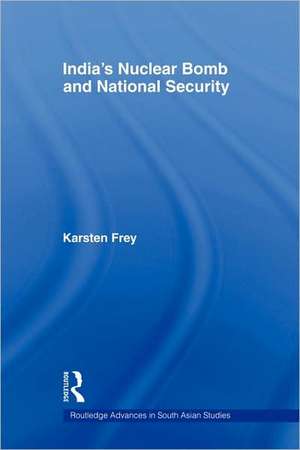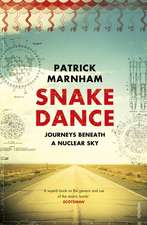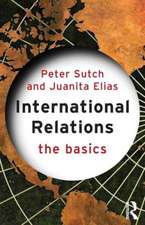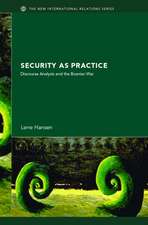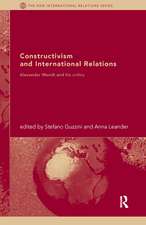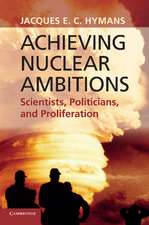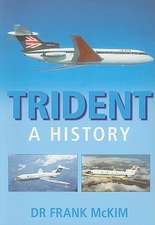India's Nuclear Bomb and National Security: Routledge Advances in South Asian Studies
Autor Karsten Freyen Limba Engleză Paperback – 21 apr 2009
Karsten Frey explores this analytic model by including explanatory variables on the unit-level, where interests are generally related to symbolic, less strategic values attributed to nuclear weapons. These play a significant role within India's domestic political party competition and among certain pressure groups. They also impacted India's relationship with other countries on non-proliferation matters, for example the concept of the country's 'status' and 'prestige'.
Identifying the role of the strategic elite in determining India's nuclear course, this book also argues that one of the pivotal driving forces behind India's quest for the nuclear bomb is India's struggle for international recognition and the strong, often obsessive sensitivities of India's elite regarding 'acts of discrimination' or 'ignorance' by the West towards India.
| Toate formatele și edițiile | Preț | Express |
|---|---|---|
| Paperback (1) | 412.03 lei 6-8 săpt. | |
| Taylor & Francis – 21 apr 2009 | 412.03 lei 6-8 săpt. | |
| Hardback (1) | 1057.09 lei 6-8 săpt. | |
| Taylor & Francis – 16 aug 2006 | 1057.09 lei 6-8 săpt. |
Din seria Routledge Advances in South Asian Studies
-
 Preț: 349.15 lei
Preț: 349.15 lei -
 Preț: 321.41 lei
Preț: 321.41 lei -
 Preț: 317.67 lei
Preț: 317.67 lei - 13%
 Preț: 298.10 lei
Preț: 298.10 lei - 26%
 Preț: 567.75 lei
Preț: 567.75 lei - 17%
 Preț: 184.81 lei
Preț: 184.81 lei - 13%
 Preț: 323.44 lei
Preț: 323.44 lei -
 Preț: 420.08 lei
Preț: 420.08 lei -
 Preț: 415.67 lei
Preț: 415.67 lei - 11%
 Preț: 304.68 lei
Preț: 304.68 lei -
 Preț: 276.84 lei
Preț: 276.84 lei - 14%
 Preț: 301.13 lei
Preț: 301.13 lei - 15%
 Preț: 721.51 lei
Preț: 721.51 lei - 25%
 Preț: 766.66 lei
Preț: 766.66 lei -
 Preț: 485.46 lei
Preț: 485.46 lei - 18%
 Preț: 1001.84 lei
Preț: 1001.84 lei - 18%
 Preț: 1052.35 lei
Preț: 1052.35 lei -
 Preț: 416.96 lei
Preț: 416.96 lei - 12%
 Preț: 298.41 lei
Preț: 298.41 lei - 18%
 Preț: 1001.07 lei
Preț: 1001.07 lei - 18%
 Preț: 1110.81 lei
Preț: 1110.81 lei - 18%
 Preț: 1058.79 lei
Preț: 1058.79 lei -
 Preț: 486.71 lei
Preț: 486.71 lei - 15%
 Preț: 675.24 lei
Preț: 675.24 lei -
 Preț: 278.75 lei
Preț: 278.75 lei - 18%
 Preț: 1054.97 lei
Preț: 1054.97 lei -
 Preț: 418.22 lei
Preț: 418.22 lei -
 Preț: 416.22 lei
Preț: 416.22 lei -
 Preț: 279.94 lei
Preț: 279.94 lei - 30%
 Preț: 846.53 lei
Preț: 846.53 lei -
 Preț: 371.68 lei
Preț: 371.68 lei - 13%
 Preț: 297.62 lei
Preț: 297.62 lei - 18%
 Preț: 1053.95 lei
Preț: 1053.95 lei - 15%
 Preț: 699.73 lei
Preț: 699.73 lei
Preț: 412.03 lei
Nou
Puncte Express: 618
Preț estimativ în valută:
78.84€ • 82.32$ • 65.25£
78.84€ • 82.32$ • 65.25£
Carte tipărită la comandă
Livrare economică 05-19 aprilie
Preluare comenzi: 021 569.72.76
Specificații
ISBN-13: 9780415544481
ISBN-10: 0415544483
Pagini: 246
Ilustrații: 2 b/w images and 2 line drawings
Dimensiuni: 156 x 234 x 13 mm
Greutate: 0.35 kg
Ediția:1
Editura: Taylor & Francis
Colecția Routledge
Seria Routledge Advances in South Asian Studies
Locul publicării:Oxford, United Kingdom
ISBN-10: 0415544483
Pagini: 246
Ilustrații: 2 b/w images and 2 line drawings
Dimensiuni: 156 x 234 x 13 mm
Greutate: 0.35 kg
Ediția:1
Editura: Taylor & Francis
Colecția Routledge
Seria Routledge Advances in South Asian Studies
Locul publicării:Oxford, United Kingdom
Public țintă
Postgraduate and UndergraduateCuprins
Introduction Part 1: Nuclear Weapons and National Interests 1. Balancing National Interests 2. Elite Perception, National Interests and India's Nuclear Policy 3. India's Nuclear Discourse: Tracking Empirical Evidence 4. Structure and Process of India's Nuclear Policy Making Part 2: Nuclear Weapons and India's Security 5. Systemic Proliferation Incentives within the South Asian Region 6. The 'Diabolic Enemy' Stereotype: Indo-Pakistan Relations 7. The China Factor in India's Strategic Thinking Part 3: Beyond Security: Nuclear Weapons and National Prestige 8. India's Self-Image as Emerging Power 9. The 'Colonialist' Stereotype: Indo-US Relations 10. The Symbol of 'Injustice' The International Non-Proliferation Regime Conclusion: Regional Ties and Global Aspirations
Notă biografică
Karsten Frey is Research Fellow at the Institut Barcelona d’Estudis Internacionals, IBEI. His research focus is on issues of global nuclear proliferation.
Recenzii
'Karsten Frey has written an important book whose well-argued conclusions may come as a surprise to some readers and as a confirmation to others.' - Robert W. Stern, Macquarie University, Australia ; Contemporary South Asia 2008
Descriere
Karsten Frey gives an analytic account of the dynamics of India's nuclear build up, putting forward a new comprehensive model which goes beyond the classic strategic model of accepting motives of arming behaviour, and incorporates the dynamics in India's nuclear programme.
